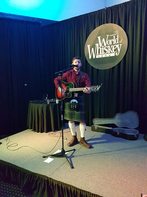 What is Patreon? Patreon is a website that allows fans of a creator (musician, artist, writer, etc.) to directly support the next project to be created. The creator makes a profile on Patreon, then invites fans to support through that site. Fans would sign up to become a patron of that creator, pledging any amount (usually $1) every time the creator shares a new piece. Why is Jesse Ferguson using Patreon? For over seven years now, I've been posting folk song videos on my YouTube channel, and have never enabled ads on the videos in order to make revenue. There are two main reasons: 1) I can't control what types of ads would appear, so there may be some that conflict with the spirit of the songs, and 2) more importantly, ads are annoying, and interfere with the creation of playlists. But, as my channel has grown in popularity (over 16,000 subscribers on last check), I've had the desire to improve the quality of the audio and video. Of course, to invest in that new equipment is very expensive, hence the turn to Patreon. Specifically, I'd like to raise the funds to buy professional video software like Sony Vegas and a proper video camera (a Canon Rebel, most likely). Of course not all viewers will want or be able to contribute in this way, and believe me I understand. Even if I don't make a dime through Patreon, I'll continue to post videos and share them with anyone who wants to listen. That said, there will likely be some incentives for Patrons, like the mp3 version of songs I record. So, if you'd like to support my folk music, please visit my Patreon page by clicking here.
1 Comment
Ever since I started public performances as a musician, I’ve kept records on the details. I have a Word document, in which I list some basics like: the date, location, type of set (Celtic, classic rock, originals), whom I played with (if any), what I got paid and the contact person who booked me. Sometimes I also write down any other important details, like problems with the sound system, attendance, etc. These records help when I’m trying to remember where I’ve got contacts, and also to help me report my income to the tax man.
Now, I’ve been playing gigs since my first year at university (2001), but I never sat down to count the number of public gigs until recently. As it turns out, my most recent gig—Apr. 7, 2017 at the Jet Set Pub in Cornwall, Ontario—was my 150th public performance. In that count I include my paid gigs, and any I did pro-bono for charity. I didn’t include any of my many times busking on the street for tips, which would likely bring the figure up to 200. 150 public performances is a good milestone at which to look back, and it certainly has been a varied and interesting 16 years. That’s roughly half of my life spent as a gigging musician, and I’ve performed in all three Canadian provinces where I’ve lived: Ontario, New Brunswick and Nova Scotia. I’ve performed in classy theatres, in the beer tents of Highland Games and other Celtic Festivals, at outdoor amphitheatres, coffee shops, farmers’ markets, weddings, funerals, pubs and restaurants. I’ve also had some regular gigs, occurring with at least monthly frequency: The Sour Grape Café in Oromocto, NB; The Auld Triangle in Sydney, NS; and more recently at The Jet Set Pub in my hometown of Cornwall, ON. These regular gigs have been great, as they allow me to focus on connecting with staff and patrons, rather than spending too much energy trying to hunt down new venues to play. So, what are my hopes for the next 16 years? Well, for one, I’m not planning to stop anytime soon. I really enjoy performing for others, which is important because the money alone isn’t enough to justify the many hours of practicing, promoting and getting to gigs. The money earned is nice and helps to cover the costs of the hobby, with a little left over for guilt-free spending money. But to keep going after 16 years there really must be a love for both music and for sharing it live with an audience. I’d love to branch out to other regions for performance, but for now the cost of travel and accommodations has really limited that possibility. In particular, I’d love to perform in the United States, but the cost of getting a performer’s visa and the tax hassles have stopped me from following up on the offers I’ve received. I’d also love to perform in Europe, but to make that viable I’d have to charge an enormous sum, which isn’t likely to be viable for a pub owner abroad. I think those plans will have to wait until I have the funds to make the trip on my own dime, and performing will be the icing on the cake. In conclusion, I’d like to thank all of the venues, booking agents, volunteers and fans who’ve supported me over this 16-year journey. In general, the people I’ve dealt with have been very supportive, and like me they see the cultural value of maintaining a live music scene, in spite of the sometimes small financial returns. I plan to keep going as long as they’ll have me, and I hope to meet more of my online friends and supporters in person during my next 150 performances. |
Jesse's BlogThoughts on music and performing by Canadian singer-songwriter Jesse Ferguson. Categories
All
|

 RSS Feed
RSS Feed
